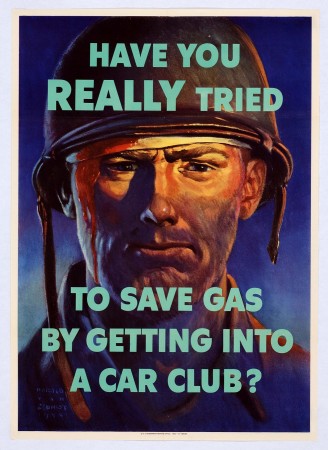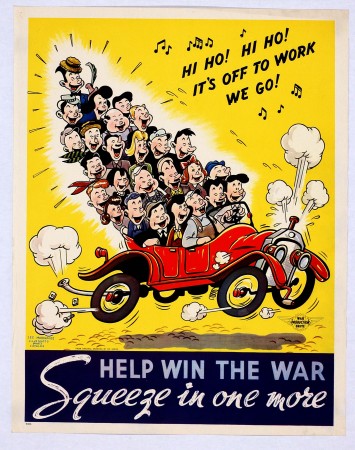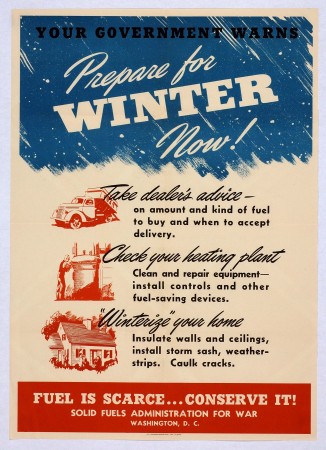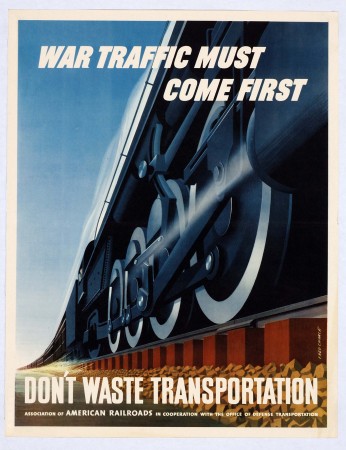What we eat, how we travel, and how our individual actions are positioned in a societal context are factors relevant to climate change. As posters from the Second World War demonstrate, similar issues were of public concern then:
One is led to wonder whether similar campaigns could be part of the transition to a low-carbon society. As a strategy, it is the opposite of decarbonization by stealth. That being said, if people could be convinced to support such an effort, it could very effectively complement our efforts to reform the hidden elements of our energy system. It could also help to entrench concern for the climate in all ideologies that resonate with large numbers of people, and help to sustain action in times of temptation and difficulty.













Wow. That first image is compelling.
I love those posters. While it’s harder to portray global warming as a villain than Hitler, those sort of images nowadays would be worth a shot IMHO.
Given the war in Iraq, the first poster is just as valid now as during the Second World War. We are trading blood for wastefully used oil.
Reducing the national speed limit to 55mph. Legislating that people ought drive economically (somehow).
Either of these things, if successful (the second is quite unlikely), would cause a catastrophic drop in the demand for oil, and a corresponding drop in the price.
Who in power honestly wants a reduction in the price of oil? Environmentalists don’t because it will encourage more consumption (even though, it is the direct effect of reducing consumption), and obviously the oil interests don’t want it.
It is not possible to reduce oil consumption significantly if the price of oil is market regulated. Reduced consumption will just result in increases of consumption.
Encouraging people to drive less may well reduce gas prices, if it succeeds. After all, the US uses about 25% of the world’s oil, and 70% of that is used for transport. It is hard to know whether the reduced prices would actually lead to more, less, or the same amount of emissions. It becomes even more uncertain in the medium and long term, given the effect of prices on capital investments and technological development.
It may not matter enormously much, ultimately. In the end, we seem likely to eventually burn all the oil available at whatever extreme price emerges in the end. It probably doesn’t matter enormously to the climate if that oil is burned in one year or fifty. What we need to encourage is the transition to an economy not based on GHG-emitting energy. Perhaps the most crucial element of that is getting rid of coal.
Sacrifices that would be more straightforward to request would be things like eating less meat, travelling less (especially by airplane), and paying for more efficient commercial and residential buildings. A case can be made that people should also be willing to bear the burden of living near nuclear power plants, the facilities that produce fuel for them, and those that store their waste.
If people on average drive at a speed and in a manner that uses 30% more fuel than need be, why encourage them to drive less, rather than drive smarter? Why can’t people drive just as much, but 30% smarter rather than 30% less and just as poorly?
Why not take driving seriously in this country, demand that people actually understand how machines work? Why do we make the comprehension of the world we live in optional simply because it’s a bit difficult? It’s pathetic.
I can give one reason: if people took driving seriously, they would take care of their cars seriously, and they would last on average 50 to 100 percent longer than they do now. That would mean less demand, and the failure of an already poorly run north American auto sector.
All the simple and easy ways to save the planet result in the destruction of our economy. Is that why we concentrate on the extremely difficult ones, like “driving less”, and building windpower rather than building energy efficient homes?
Is it that if the solutions were not megaprojects, we could not sustain the continual increase in the size of the economy?
For both cars and buildings, it seems essential that the government step in with higher standards.
We should demand much more fuel efficient cars, even if that means reduced horsepower. There is no reason for which an ordinary family car needs to be able to go 180km/h.
We should also demand higher building standards: both for new construction and for when buildings are renovated. I read that in Germany, anyone wanting to renovate a house needs to bring the whole building up to the newest minimum efficiency standard.
Yes, these are all ‘interference’ in the market. That being said, the market clearly cannot deal with climate change by itself. The people who benefit from causing it have money to spend here and now. Those who will be harmed are primarily (a) poor (b) not yet born or (c) both.
While ‘destroying’ our economy is a politically impossible choice, reforming it to put it on a sustainable footing is something we just might manage with enough energy and effort.
It probably doesn’t matter enormously to the climate if that oil is burned in one year or fifty.
On further reflection, it does matter. Just consider two scenarios:
A) We make a gradual transition towards less fossil-fuel-dependent modes of production and transport. By the time oil runs out (or becomes prohibitively expensive), we have largely eliminated our dependence on it.
B) We stick to business as usual, and the permanent end of cheap oil comes as an abrupt shock.
In the latter case, it seems likely that we would grab at a disastrously poor option: heavy oil upgrading (oil sands) and the conversion of coal-to-liquids.
“There is no reason for which an ordinary family car needs to be able to go 180km/h.”
Any car that is incapable, because of power not because of a speed limiter, of 180 km/h, would be incredibly slow at accelerating. People demand cars today which have enough power to do 250km/h, even though most are speed-limited to 180km/h.
The Loremo, a concept car which gets 1/5L/100km, will do 160km/h.
Any car which is incapable of 180km/h will not be able to do 100km/h up very much of a hill.
While a car which produces more power will burn more fuel, current car design is such that more aerodynamic shaping (i.e. less stylish by contemporary standards) would make a large difference as well.
It is significant that the fleet economy has not improved in the last 15 years.
Could hybrid systems be a partial solution to this? You could have one energy system (gasoline or electric motor) that only provides acceleration at times when it is needed, alongside a much more efficient system that operates when the vehicle is moving at a constant speed.
How do the drag coefficients of relatively efficient contemporary cars (Honda civics and the like) compare with the maximum plausible ones, given existing materials and the shape constraints inherent to conventional automobile design?
The International Energy Agency (IEA) estimates that reducing speed limits in the US to 90 km/hr would save more than 500,000 barrels of oil per day.
This document considers ways oil demand could be reduced in an emergency, such as a repeat of the 1973 OPEC oil crisis.
“Reducing speed limits on motorways can be very effective for saving fuel, since cars and trucks use much more fuel per kilometre as speeds increase above 90 kilometres per hour (about 55 mph). However, success depends on an adequate enforcement regime. In some cases better enforcement of existing speed limits may be sufficient to lower average speeds significantly. Clear information to the public regarding the strong links between lower speeds and fuel savings may help increase compliance during an emergency. An infrastructure allowing a rapid change to posted speed limits (such as variable speed limit signs) must be put in place ahead of time.
These types of policies, requiring some coercion or restriction on behaviour, may be more acceptable to the public during emergency situations than otherwise, if a sense of the need for common sacrifice is prevalent. In any case, popularity is likely to be fairly low.”
(p.21)